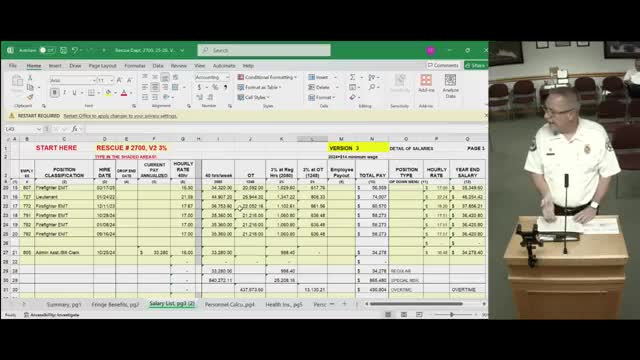County Adopts New Medicaid Transport Program Boosting Revenue By $132,000
August 05, 2025 | Baker County, Florida
This article was created by AI summarizing key points discussed. AI makes mistakes, so for full details and context, please refer to the video of the full meeting. Please report any errors so we can fix them. Report an error »

In the heart of Baker County, Florida, the Board of County Commissioners convened for a pivotal budget workshop on August 5, 2025. The atmosphere was charged with anticipation as officials prepared to discuss the financial framework that would shape the county's services for the coming year.
One of the key topics was the increasing demand for emergency medical services. Officials noted a consistent trend in staffing needs, highlighting that the county required at least 30 personnel to adequately cover shifts. This year, the demand had risen, with 28 shifts needing to be filled monthly. The discussion underscored the importance of maintaining a robust emergency response team to ensure community safety.
Financial implications were a significant focus, particularly regarding the county's special risk insurance, which saw a notable 16% increase, translating to an additional $156,000. This rise in costs prompted questions about budget allocations and the sustainability of funding for essential services.
Another critical point of discussion was the county's participation in a state program aimed at enhancing Medicaid transportation reimbursements. Since joining the program in 2020, Baker County has seen a substantial return on investment, with last year's net revenue reaching approximately $132,000 after accounting for state payments. This program has become a vital source of funding, allowing the county to bolster its emergency medical services without straining local resources.
The commissioners also reviewed the performance of their EMS billing company, Ellevos, which has been instrumental in increasing revenue from emergency transports. With a reported 14% increase in revenue over the previous year, the county is on track to exceed its projected income, potentially reaching over $1 million by the end of the fiscal year. This financial success is attributed to effective billing practices and a commitment to service quality.
As the meeting progressed, the commissioners engaged in a thorough examination of budgetary adjustments, balancing increased operational costs with the need for enhanced services. The dialogue reflected a shared commitment to fiscal responsibility while ensuring that the county's emergency services remain well-funded and effective.
In conclusion, the budget workshop not only highlighted the financial challenges facing Baker County but also showcased the proactive measures being taken to address them. With a focus on community safety and service efficiency, the commissioners are poised to make informed decisions that will impact the lives of residents for years to come. As the meeting adjourned, the sense of collaboration and determination lingered in the air, signaling a hopeful outlook for Baker County's future.
One of the key topics was the increasing demand for emergency medical services. Officials noted a consistent trend in staffing needs, highlighting that the county required at least 30 personnel to adequately cover shifts. This year, the demand had risen, with 28 shifts needing to be filled monthly. The discussion underscored the importance of maintaining a robust emergency response team to ensure community safety.
Financial implications were a significant focus, particularly regarding the county's special risk insurance, which saw a notable 16% increase, translating to an additional $156,000. This rise in costs prompted questions about budget allocations and the sustainability of funding for essential services.
Another critical point of discussion was the county's participation in a state program aimed at enhancing Medicaid transportation reimbursements. Since joining the program in 2020, Baker County has seen a substantial return on investment, with last year's net revenue reaching approximately $132,000 after accounting for state payments. This program has become a vital source of funding, allowing the county to bolster its emergency medical services without straining local resources.
The commissioners also reviewed the performance of their EMS billing company, Ellevos, which has been instrumental in increasing revenue from emergency transports. With a reported 14% increase in revenue over the previous year, the county is on track to exceed its projected income, potentially reaching over $1 million by the end of the fiscal year. This financial success is attributed to effective billing practices and a commitment to service quality.
As the meeting progressed, the commissioners engaged in a thorough examination of budgetary adjustments, balancing increased operational costs with the need for enhanced services. The dialogue reflected a shared commitment to fiscal responsibility while ensuring that the county's emergency services remain well-funded and effective.
In conclusion, the budget workshop not only highlighted the financial challenges facing Baker County but also showcased the proactive measures being taken to address them. With a focus on community safety and service efficiency, the commissioners are poised to make informed decisions that will impact the lives of residents for years to come. As the meeting adjourned, the sense of collaboration and determination lingered in the air, signaling a hopeful outlook for Baker County's future.
View full meeting
This article is based on a recent meeting—watch the full video and explore the complete transcript for deeper insights into the discussion.
View full meeting